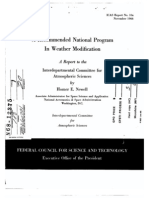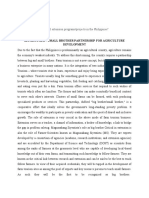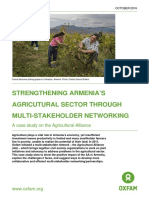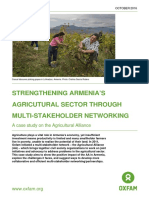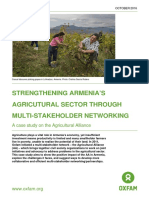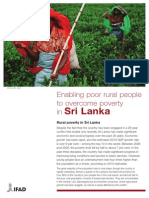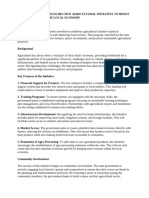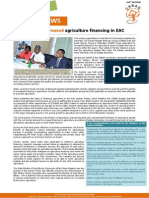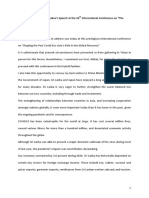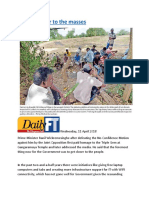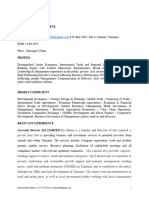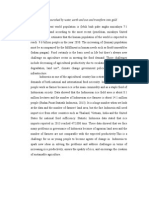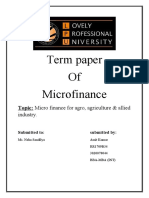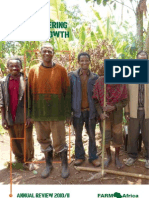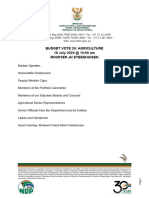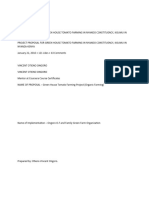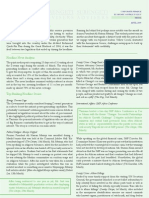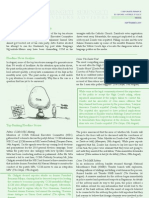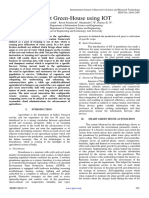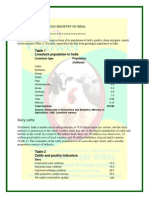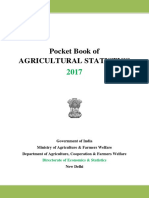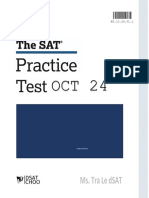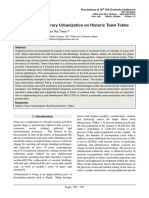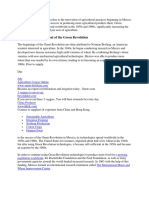Agrisol Energy Tanzania - Letter To Tanzania
Agrisol Energy Tanzania - Letter To Tanzania
Uploaded by
serengeti_advisersCopyright:
Available Formats
Agrisol Energy Tanzania - Letter To Tanzania
Agrisol Energy Tanzania - Letter To Tanzania
Uploaded by
serengeti_advisersOriginal Title
Copyright
Available Formats
Share this document
Did you find this document useful?
Is this content inappropriate?
Copyright:
Available Formats
Agrisol Energy Tanzania - Letter To Tanzania
Agrisol Energy Tanzania - Letter To Tanzania
Uploaded by
serengeti_advisersCopyright:
Available Formats
July 6, 2011
Fellow Tanzanians: As AgriSol Energy Tanzania Limiteds development activities in Tanzania progress, we want to be sure that you know and understand how our proposed project is designed to enable and empower Tanzanian farmers to significantly increase the use and productivity of our nations farmland for the benefit of our country. Some recent news accounts and reports have inaccurately portrayed our intentions. Having been involved in the AgriSol Tanzania project from the beginning, I personally know the people, the plans, the politics and the potential of this project for Tanzania. I also know that the news accounts are wrong. Our project is about partnering with world-class agricultural experts and putting Tanzanian farmland to its best and fullest use. AgriSol is focused on being a major sponsor of significant, long-term and sustainable change in emerging agricultural markets by bringing state-of-the-art farming practices, modern seeds and other inputs, and top-quality farming equipment to such markets. Our ultimate objective is to create large-scale agriculture zones that: Help stabilize local food supplies and bring lasting food security to our country; Create jobs and economic opportunity for local populations; Spur investment in local infrastructure improvements; Develop new markets for our agricultural products; and Attract investment in related businesses. In developing this project, we have always sought to work only with people and organizations that have a demonstrated track record and commitment to sustainable and socially responsible agriculture, as exemplified by our American partners in AgriSol Energy Tanzania Limited, and to working with small farmers. We bring our own significant local expertise to the project, and we have also specifically sought the involvement of other local experts and institutions, for example, by partnering with Sokoine University of Agriculture, the leading Tanzanian agricultural institution. Our team also includes experts in commercial agriculture, educational outreach and small landholder programs from Iowa State Universitys College of Agriculture and Life Sciences (one of the leading agricultural universities in the world), and international business development and finance. AgriSol also will use its relationships with leading global and regional suppliers of seed and fertilizers, farming equipment and technical expertise for the benefit of our project. Importantly, our project is consistent with the vision of President Jakaya Kikwete to transform the countrys economy through significant, long-term investment in agriculture. The ambitious Kilimo Kwanza strategy is central to AgriSols mission to forge a partnership with the government and with farmers to ensure that Tanzania rises above subsistence farming, low productivity and limited access to the best farming practices.
67 Kibo Road | Mikocheni A | Dar es Salaam | Tanzania www.agrisolenergy.com
AgriSol firmly believes that the best way to tackle these issues in Tanzania is to develop agricultural enterprises that combine large-scale, profitable commercial farming with significant local outreach and outgrower programs for small landholders. This approach will not only stabilize local and national food supplies and create local jobs and prosperity, it also will support: Organized, efficient and transparent markets for agricultural products, providing small farmers with enhanced access to local, national, regional and global farming production, inventory and pricing data; Increased access to funding for similar and complementary agricultural businesses; and Greater investment in roads, rail, water and air transportation infrastructure, and crop and value-added product storage, processing and distribution.
Additionally, profits generated from this type of venture will support long-term investments in cooperative organizations and community investment trusts. These trusts will invest in local medical clinics, schools, water sourcing and treatment systems, power generation and other types of infrastructure that will have a profound and positive impact on the quality of life for local populations. Regarding the proposed agriculture zones, our government made AgriSol aware of three tracts of land in western Tanzania that were previously used as camps for refugees, but were, at the time, either closed or being closed. The decision to close these camps was made well before AgriSol became involved and was based on a model program agreed to with the United Nations. The government then designated these lands for modern agricultural development, as part of the Kilimo Kwanza initiative, in order to restore the land to productivity. Despite being in fairly remote locations with limited road, power and water infrastructure, AgriSol found these tracts to have attractive agroclimatic conditions and to be geographically wellpositioned to serve growing local, national and regional markets. While these lands represent a very small portion of Tanzanias vast land resources, these factors led AgriSol to conclude that these lands provide a major opportunity to demonstrate the nations ability to feed its own people and contribute to world food supplies on an accelerated basis. As part of its feasibility analysis for this project, AgriSol has spent considerable time consulting with key participants in Tanzania to ensure that we have taken into account local and national interests appropriately, including: Meeting repeatedly over several months with local and national officials and representatives in Mpanda, Rukwa, with the full knowledge of the central government, to discuss our vision for agricultural development in their region and the country and to seek their input and guidance; Hosting our Prime Minister, Hon. Mizengo Kayanza Peter Pinda, and key local and national government officials on visits to the U.S. to see our partners modern, largescale commercial farming operations, and to meet with Iowa State University experts in small landholder outreach; Attending and presenting at an investment forum held in Mpanda for Rukwa and Kigoma regions at the invitation of the Honorable Prime Minister, who chaired the meeting, and which was attended by several members of the cabinet along with senior government officials at the local and national levels;
67 Kibo Road | Mikocheni A | Dar es Salaam | Tanzania www.agrisolenergy.com
Sponsoring a workshop in Dar-es-Salaam with local and national government officials, and including Iowa State University, to discuss and obtain their input into the development of small landholder and community programs specific to western Tanzania; and Contracting a leading Tanzanian agricultural consultancy, Diligent Consulting Ltd., to evaluate local, national and regional crop and value-added product markets, local infrastructure and small landholder activity in western Tanzania.
AgriSol anticipates beginning commercial farming and small landholder and community programs in Tanzania in 2012, starting with modest activities in the initial years. In addition to food security, a key initial focus will be on fighting Tanzanias protein deficiency problem by investing in crop cultivation and value-added businesses, including animal feed, cooking oil and livestock production. AgriSol is committed to conducting its operations in a socially and environmentally responsible manner, and we welcome feedback and questions from all stakeholders. We have a deep respect for our fellow citizens, and we are realistic about the challenges ahead. We also are unshakably optimistic about Tanzanias future and the contribution that our project can make to our collective food security and economic prosperity. Asanteni sana,
Iddi Mohammed Simba, on behalf of AgriSol Energy Tanzania Limited
About Mr. Simba: Iddi Simba is the founding Chairman of PRIDE Tanzania, was the founding Director-General of the East African Development Bank, former Resident Director of the African Development Bank in London, and Member of Parliament and Minister for Trade and Industry in the Tanzanian government. He continues to maintain meaningful relations with the Government of Tanzania, and was recently appointed to the Bomani Commission, which was set up in 2007 to investigate and review mining contracts in Tanzania. Mr. Simba sits on the Board of Directors of several media, manufacturing and financial services firms.
67 Kibo Road | Mikocheni A | Dar es Salaam | Tanzania www.agrisolenergy.com
You might also like
- Fish Farming ProposalDocument16 pagesFish Farming ProposalAngelo Mwamburi87% (100)
- Dairy Investment ProposalDocument16 pagesDairy Investment ProposalAfrath_n100% (3)
- National Program in Weather Mod 1966.pdf"Document97 pagesNational Program in Weather Mod 1966.pdf"Thom Lee ChapmanNo ratings yet
- Africa Business ClassroomDocument30 pagesAfrica Business Classroomtebur shuNo ratings yet
- KPMG Golf Participation ReportDocument18 pagesKPMG Golf Participation Reportgasbbound1No ratings yet
- New Proposal 1Document13 pagesNew Proposal 1Youth for Agriculture Abuja-Nigeria AbujaNo ratings yet
- State of The County Address 2015Document41 pagesState of The County Address 2015api-257650005No ratings yet
- KISARAWEDocument15 pagesKISARAWEPisper C ConstantineNo ratings yet
- MoA Maize FarmingDocument10 pagesMoA Maize FarmingUk UkNo ratings yet
- Nacionalista Party PlatformDocument9 pagesNacionalista Party PlatformManuel L. Quezon IIINo ratings yet
- Aip-Prisma Comms Prismarural ProfilesDocument2 pagesAip-Prisma Comms Prismarural ProfilesDwitya AribawaNo ratings yet
- PT NHM Factsheet CSRDocument2 pagesPT NHM Factsheet CSRFran SidetteNo ratings yet
- Extension AgricultureDocument6 pagesExtension AgricultureSpywi FranzineNo ratings yet
- Speech by He Yoweri Kaguta Museveni On Labour Day 2017Document10 pagesSpeech by He Yoweri Kaguta Museveni On Labour Day 2017The Independent MagazineNo ratings yet
- One Province. One System.: Hon. Alfonso V. Umali, Jr. Hon. Reynaldo V. UmaliDocument62 pagesOne Province. One System.: Hon. Alfonso V. Umali, Jr. Hon. Reynaldo V. UmaliRey Umali100% (1)
- Preident Uhuru Kenyatta's Speech During The 2013 a.S.K. Nairobi International Trade Fair, Jamhuri Park Showground, NairobiDocument4 pagesPreident Uhuru Kenyatta's Speech During The 2013 a.S.K. Nairobi International Trade Fair, Jamhuri Park Showground, NairobiState House KenyaNo ratings yet
- Job 04 World Institutions DetailsDocument39 pagesJob 04 World Institutions DetailsAshutosh SharmaNo ratings yet
- Strengthening Armenia's Agricultural Sector Through Multi-Stakeholder Networking: A Case Study On The Agricultural AllianceDocument11 pagesStrengthening Armenia's Agricultural Sector Through Multi-Stakeholder Networking: A Case Study On The Agricultural AllianceOxfamNo ratings yet
- Strengthening Armenia's Agricultural Sector Through Multi-Stakeholder Networking: A Case Study On The Agricultural AllianceDocument11 pagesStrengthening Armenia's Agricultural Sector Through Multi-Stakeholder Networking: A Case Study On The Agricultural AllianceOxfamNo ratings yet
- Strengthening Armenia's Agricultural Sector Through Multi-Stakeholder Networking: A Case Study On The Agricultural AllianceDocument11 pagesStrengthening Armenia's Agricultural Sector Through Multi-Stakeholder Networking: A Case Study On The Agricultural AllianceOxfamNo ratings yet
- Strengthening Armenia's Agricultural Sector Through Multi-Stakeholder Networking: A Case Study On The Agricultural AllianceDocument11 pagesStrengthening Armenia's Agricultural Sector Through Multi-Stakeholder Networking: A Case Study On The Agricultural AllianceOxfamNo ratings yet
- Strengthening Armenia's Agricultural Sector Through Multi-Stakeholder Networking: A Case Study On The Agricultural AllianceDocument11 pagesStrengthening Armenia's Agricultural Sector Through Multi-Stakeholder Networking: A Case Study On The Agricultural AllianceOxfamNo ratings yet
- Strengthening Armenia's Agricultural Sector Through Multi-Stakeholder Networking: A Case Study On The Agricultural AllianceDocument11 pagesStrengthening Armenia's Agricultural Sector Through Multi-Stakeholder Networking: A Case Study On The Agricultural AllianceOxfamNo ratings yet
- Strengthening Armenia's Agricultural Sector Through Multi-Stakeholder Networking: A Case Study On The Agricultural AllianceDocument11 pagesStrengthening Armenia's Agricultural Sector Through Multi-Stakeholder Networking: A Case Study On The Agricultural AllianceOxfamNo ratings yet
- Strengthening Armenia's Agricultural Sector Through Multi-Stakeholder Networking: A Case Study On The Agricultural AllianceDocument11 pagesStrengthening Armenia's Agricultural Sector Through Multi-Stakeholder Networking: A Case Study On The Agricultural AllianceOxfamNo ratings yet
- CSR For Agricultural WorkersDocument2 pagesCSR For Agricultural WorkersAchal MittalNo ratings yet
- 8 - Point Development Agenda: 1. Participatory GovernanceDocument2 pages8 - Point Development Agenda: 1. Participatory GovernanceJames Domini Lopez LabianoNo ratings yet
- Bulletin: NGO and IITA Sign Agreement Farmers Visit IITADocument4 pagesBulletin: NGO and IITA Sign Agreement Farmers Visit IITAInternational Institute of Tropical AgricultureNo ratings yet
- BRAC TanzaniaDocument128 pagesBRAC Tanzaniaaladin0001No ratings yet
- President Uhuru Kenyatta's Speech During The Official Launch of The Second Medium Term Plan and Signing of Performance Contracts For Cabinet SecretariesDocument5 pagesPresident Uhuru Kenyatta's Speech During The Official Launch of The Second Medium Term Plan and Signing of Performance Contracts For Cabinet SecretariesState House KenyaNo ratings yet
- Alyansang KabataanDocument4 pagesAlyansang KabataanHenrick YsonNo ratings yet
- Srilanka 2Document8 pagesSrilanka 2Gaurav TanwerNo ratings yet
- Seaweed Development Strategic PlanDocument64 pagesSeaweed Development Strategic PlanTahsinBakurt100% (1)
- An Article On The Recent Happenings in The Agricultural Sector in Osun StateDocument2 pagesAn Article On The Recent Happenings in The Agricultural Sector in Osun StatephynamitchellNo ratings yet
- Enabling Poor Overcome PovertyDocument8 pagesEnabling Poor Overcome PovertyRoslyn Manila DinerosNo ratings yet
- Determinants of Rural Development 01Document8 pagesDeterminants of Rural Development 01Tilahun Wegene40% (5)
- Tanzania Agricultural PolicyDocument5 pagesTanzania Agricultural PolicyShuby MariwaNo ratings yet
- Breaking News: Csos Root For IncreasedDocument1 pageBreaking News: Csos Root For Increasedapi-284426542No ratings yet
- More Than CashDocument76 pagesMore Than CashDenzel Edward CariagaNo ratings yet
- Cooperative Business Plan in Alcala PhilDocument24 pagesCooperative Business Plan in Alcala Philmilesdeasis25No ratings yet
- Full Speech by President Gotabaya Rajapaksa at "The Future of Asia" ConferenceDocument10 pagesFull Speech by President Gotabaya Rajapaksa at "The Future of Asia" ConferenceAdaderana OnlineNo ratings yet
- Healthy - NC Framework: Participatory GovernanceDocument14 pagesHealthy - NC Framework: Participatory Governancechiri Charm gabaldonNo ratings yet
- Getting Closer To The MassesDocument15 pagesGetting Closer To The MassesThavamNo ratings yet
- 122 - Naufal Hiro Oka - ReadingDocument10 pages122 - Naufal Hiro Oka - ReadingHiro OkaNo ratings yet
- Janet Janet Zebedayo Mbene CV Latest 2023 Mbene CV Latest 2023Document10 pagesJanet Janet Zebedayo Mbene CV Latest 2023 Mbene CV Latest 2023JANETNo ratings yet
- Rice Is Nourished by Water, Earth and Sun and Transform Into GoldDocument5 pagesRice Is Nourished by Water, Earth and Sun and Transform Into GoldIndriani SavitriNo ratings yet
- SEHF Essay Competition 2024 Entry.Document6 pagesSEHF Essay Competition 2024 Entry.michaelpaul08035961825No ratings yet
- Introduction To Economics Course WorkDocument9 pagesIntroduction To Economics Course Workkizito thomasmoreNo ratings yet
- ResourcesDocument6 pagesResourcesShanta SikaluNo ratings yet
- Program, A Direct Credit Window From LANDBANK, Offers Farmers Integrated Support ThatDocument1 pageProgram, A Direct Credit Window From LANDBANK, Offers Farmers Integrated Support ThatMark Kenneth BaldoqueNo ratings yet
- Cooperative Business Plan in Alcala PhilDocument24 pagesCooperative Business Plan in Alcala PhilHome Grown Digital AdvertisingNo ratings yet
- Agribusiness Development Cardno A3Document2 pagesAgribusiness Development Cardno A3Ann PulidoNo ratings yet
- Project Proposal For KetumbieneDocument23 pagesProject Proposal For KetumbieneRiaz Naser KhanNo ratings yet
- Agricultural Mechanization Initiative in Tanzania PDFDocument3 pagesAgricultural Mechanization Initiative in Tanzania PDFavinashmunnuNo ratings yet
- Setting Up and Running A Small Scale Dairy Processing Business - CTA - OFP-Dairy - PRF - Amended (L-R)Document188 pagesSetting Up and Running A Small Scale Dairy Processing Business - CTA - OFP-Dairy - PRF - Amended (L-R)jliu878100% (1)
- Micro Finance For Agro, Agriculture & Allied IndustryDocument10 pagesMicro Finance For Agro, Agriculture & Allied IndustryAmit SoniNo ratings yet
- FARM-Africa Annual Review 2010-11Document15 pagesFARM-Africa Annual Review 2010-11FARMAfricaNo ratings yet
- Budget Vote Speech, Minister of Agriculture, MR JH Steenhuisen (MP)Document9 pagesBudget Vote Speech, Minister of Agriculture, MR JH Steenhuisen (MP)dumisaninsele11No ratings yet
- Sample of Bs Tomato PlanDocument16 pagesSample of Bs Tomato PlanPaul OlaleNo ratings yet
- President Rajapaksa's Address On 73rd Independence DayDocument8 pagesPresident Rajapaksa's Address On 73rd Independence DayAdaderana OnlineNo ratings yet
- Financial Monthly - July 2011 v2Document2 pagesFinancial Monthly - July 2011 v2serengeti_advisersNo ratings yet
- Serengeti Advisers - Media Report March 2009Document7 pagesSerengeti Advisers - Media Report March 2009serengeti_advisersNo ratings yet
- Is The Common Mwanachi Benefitting From The EAC (March 2011)Document16 pagesIs The Common Mwanachi Benefitting From The EAC (March 2011)serengeti_advisersNo ratings yet
- Serengeti Advisers - Media Report October 09-1Document8 pagesSerengeti Advisers - Media Report October 09-1serengeti_advisersNo ratings yet
- Serengeti Advisers - Media Report September 2009Document8 pagesSerengeti Advisers - Media Report September 2009ECONOMYTICKERNo ratings yet
- Serengeti Advisers - Media Report August 2009 v3Document8 pagesSerengeti Advisers - Media Report August 2009 v3serengeti_advisersNo ratings yet
- Extension-Assessment...Document19 pagesExtension-Assessment...jessamynn.corpuzNo ratings yet
- Data Mining - An Evolutionary View of AgricultureDocument4 pagesData Mining - An Evolutionary View of AgricultureInternational Journal of Application or Innovation in Engineering & ManagementNo ratings yet
- A Fieldwork Investigation of My Local Area's Human and Physical Geography PDFDocument11 pagesA Fieldwork Investigation of My Local Area's Human and Physical Geography PDFCatalinNo ratings yet
- Smart Green House Using IOTDocument4 pagesSmart Green House Using IOTInternational Journal of Innovative Science and Research Technology100% (1)
- Quality Assessment of Cookies Produced From Wheat Flour and Malted Barley (Hordeum Vulgare) Bran BlendsDocument12 pagesQuality Assessment of Cookies Produced From Wheat Flour and Malted Barley (Hordeum Vulgare) Bran BlendsAndre Luiz Saback CohinNo ratings yet
- Factors Affecting Effective Delivery of Agricultural Science Practical Lessons in Senior Secondary Schools in Ebonyi State of NigeriaDocument9 pagesFactors Affecting Effective Delivery of Agricultural Science Practical Lessons in Senior Secondary Schools in Ebonyi State of NigeriafredNo ratings yet
- Agricultural DevelopmentDocument14 pagesAgricultural DevelopmentSyeda Tooba KazmiNo ratings yet
- A Report of Livestock Industry of IndiaDocument16 pagesA Report of Livestock Industry of IndiaGrowel Agrovet Private Limited.No ratings yet
- A Project Report On FDI in Indian Retail SectorDocument43 pagesA Project Report On FDI in Indian Retail Sectorjainudit31267% (12)
- Pre-Feasibity Report of Deuchuli Panighat MHPDocument11 pagesPre-Feasibity Report of Deuchuli Panighat MHPsunilNo ratings yet
- Tea Back Up PDFDocument65 pagesTea Back Up PDFNeal TaylorNo ratings yet
- CLMV Malaysia CLMV Vol 1Document35 pagesCLMV Malaysia CLMV Vol 1Yoke Cheng AwNo ratings yet
- PROJECT STUDY PROPOSAL - Rev01 ALLAN RECANADocument26 pagesPROJECT STUDY PROPOSAL - Rev01 ALLAN RECANAjohn-john castañedaNo ratings yet
- Indian Standard Parameters and Analysis For Atta, Maida and SujiDocument17 pagesIndian Standard Parameters and Analysis For Atta, Maida and SujiVasudeva Prasad Nemala67% (3)
- Seven Steps of Marketing Latest Version PDFDocument334 pagesSeven Steps of Marketing Latest Version PDFNicholas MundiaNo ratings yet
- Apple Cultivation in Himachal Pradesh: SWOT Analysis and Identified Issues For The Sector Development - A Case StudyDocument6 pagesApple Cultivation in Himachal Pradesh: SWOT Analysis and Identified Issues For The Sector Development - A Case StudyPayal Rajpoot VermaNo ratings yet
- Pocket Book of Agricultural Statistics 2017Document128 pagesPocket Book of Agricultural Statistics 2017Swapan Kumar DasguptaNo ratings yet
- Disclosure To Promote The Right To InformationDocument15 pagesDisclosure To Promote The Right To InformationSander SermusNo ratings yet
- Make Time To Take The Practice Test.: It Is One of The Best Ways To Get Ready For The SATDocument13 pagesMake Time To Take The Practice Test.: It Is One of The Best Ways To Get Ready For The SATtrieuvyemmaNo ratings yet
- Ioegc 10 052 10072Document8 pagesIoegc 10 052 10072shresthanikhil078No ratings yet
- The Term Green Revolution Refers To The Renovation of Agricultural Practices Beginning in Mexico in The 1940sDocument3 pagesThe Term Green Revolution Refers To The Renovation of Agricultural Practices Beginning in Mexico in The 1940sHira ChNo ratings yet
- The Sustainability of Food Supply at Public Market in City of Malabon During The PandemicDocument13 pagesThe Sustainability of Food Supply at Public Market in City of Malabon During The PandemicMarianjoy FernandezNo ratings yet
- 1956 12 Unesco. Courier Ten Years of UNESCO 1946-1956Document52 pages1956 12 Unesco. Courier Ten Years of UNESCO 1946-1956kareem79No ratings yet
- SBMPTN Bahasa Inggris: Kode SoalDocument4 pagesSBMPTN Bahasa Inggris: Kode SoalhudayanaNo ratings yet
- 522087Document45 pages522087raz1355No ratings yet
- Layens - Un Capitol Din LayensDocument9 pagesLayens - Un Capitol Din LayensCristi PascalNo ratings yet
- Sa DefDocument16 pagesSa DefjayzlajoresNo ratings yet


